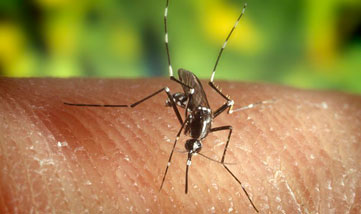 |
| Courtesy of the Centers for Disease Control and Prevention |
The new gene editing tech CRISPR/Cas9 has given a team of researchers in the U.K. the tools it needs to genetically alter a mosquito and pass along an infertility trait that could largely wipe out pests that are known to spread malaria.
The group at Imperial College London modified Anopheles gambiae with a reengineered gene that interferes with egg production. And using "gene drive" technology they were able to engineer the mosquitoes to pass it along to 90% of their offspring, they report this week in Nature Biotechnology.
"The field has been trying to tackle malaria for more than 100 years. If successful, this technology has the potential to substantially reduce the transmission of malaria," said co-author Professor Andrea Crisanti from the Department of Life Sciences at Imperial.
Dramatically changing the fertility rate of any species--even one that is known to spread malaria--raises some thorny questions for everyone in the gene editing world. These investigators aren't ready to simply unleash an infertile mosquito on the world. Instead, they say they'll need about a decade to absolutely ensure that this can be done safely. But the technology has the potential to replace far more expensive mosquito eradication efforts around the world.
In this experiment, the researchers identified three genes that could disrupt fertility of the mosquitoes. Those genes were then modified using CRISPR/Cas9 to make it a highly inheritable trait in the species, earning fresh headlines for a new technology which has rapidly emerged as a cheap and accessible tool for investigators.
"We hope others will use our technique to understand how mosquitoes work, giving us more ammunition in the fight against malaria," said first author Andrew Hammond, also from Imperial's Department of Life Sciences.
- here's the release
- get the journal article